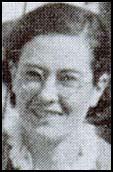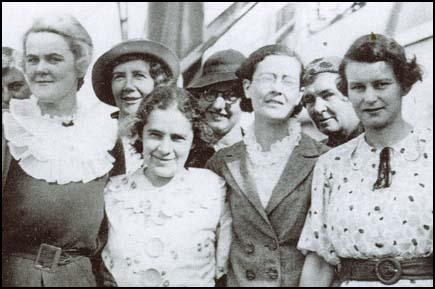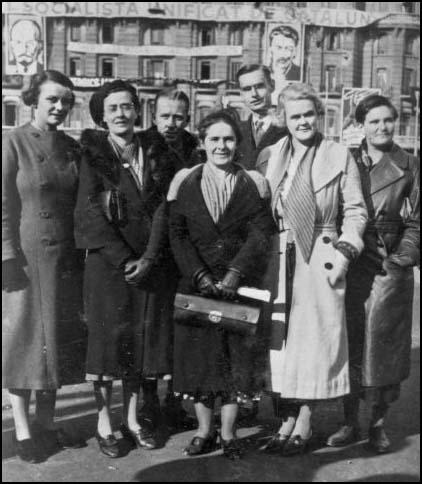May Macfarlane

May Macfarlane was born in West Australia in 1909. She worked as a nurse in Brisbane and in a small town in New South Wales before completing a midwifery qualification at Crown Street Women's Hospital in Sydney.
Macfarlane was radicalized by the Egon Kisch case in 1934. Macfarlane became involved in the struggle to stop him being deported from Australia. During this period she joined the Communist Party of Australia. As Judith Keene pointed out in her book, The Last Mile to Huesca: An Australian Nurse in the Spanish Civil War (1988): "She read Kisch's On the Pacific Front and the literature of the Movement Against War and Fascism. The coherence of the communist analysis attracted her and she was impressed by the dedication of individual communists in defending the rights of the powerless in Australia."
In 1935 Macfarlane found work at Lidcombe State Hospital and Home for Men in Sydney. Also working at the hospital were Mary Lowson and Una Wilson. The three women became involved in the struggle to improve the pay and conditions of the nurses at the hospital.

on board ship in Sydney in October 1936.
In August 1936 the Australian Spanish Relief Committee decided to send a medical aid unit caring for Republican wounded during the Spanish Civil War. This included sending four nurses from Australia. Lowson applied and was accepted and in October 1936 she travelled from Sydney to Barcelona on the Oransay with Agnes Hodgson, Mary Lowson and Una Wilson. Wilson told reporters shortly before sailing: "If we get captured or shot that's that. It's only a few years off your life and its better than spending all your days in a private hospital. Danger is the spice of life, that and the feeling that we'll be doing something with real meaning."
The women arrived in Barcelona on 1st December 1936. Mary Lowson immediately informed Kenneth Sinclair Loutit and Hugh O'Donnell, administrators for British Medical Aid, that Agnes Hodgson was a fascist who she considered was spying on behalf of the Nationalists. She was immediately called in for questioning by the Partit Socialista Unificat de Catalunya (PSUC). May Macfarlane and Una Wilson complained to Lowson about how their colleague was being treated. They claimed they would return to Australia if anything happened to Hodgson. Writing later to the Australian Spanish Relief Committee about Lowson's behaviour, she admitted that she feared "they would be bumped off."

Eventually, May Macfarlane, Mary Lowson and Una Wilson travelled to the International Brigade hospital near Albacete, whereas Agnes Hodgson was left behind in Barcelona. Lowson, after a few weeks working at the hospital returned to the city where she was attached to the English Section of the Republican Information Service which produced propaganda for the Popular Front government in Spain.
May and Una nursed the wounded for the next two years on the Madrid and Aragon fronts and the base hospital in Mataró. According to Judith Keene, the author of The Last Mile to Huesca: An Australian Nurse in the Spanish Civil War (1988): "They nursed the wounded under horrendous conditions and were sterling examples of the nursing profession." The two women remained in the country until the International Brigades were withdrawn at the end of 1938 and were repatriated to Australia in February 1939.
Primary Sources
(1) Judith Keene, The Last Mile to Huesca: An Australian Nurse in the Spanish Civil War (1988)
May Macfarlane, at 27 years of age the "baby of the group", was a qualified triple-certificated nurse. A West Australian who had nursed in Brisbane and far northern New South Wales, May completed her midwifery at Crown Street Women's Hospital in Sydney. "Mac", as she was called by everyone, had recently joined the Communist Party. Having grown up in a politically active family in Western Australia, she had been radicalized by the Egon Kisch affair at the end of 1934 and the lengths to which the Australian government had "stooped" to prevent his landing in Australia. She read Kisch's On the Pacific Front and the literature of the Movement Against War and Fascism. The coherence of the communist analysis attracted her and she was impressed by the dedication of individual communists in defending the rights of the powerless in Australia. For May Macfarlane, the Spanish civil war crystallized all these strands in her political development and offered a demanding challenge.
(2) Agnes Hodgson, diary entry (17th November, 1936)
Arrived at Aden. All went ashore and walked round the town - Macfarlane and self photographing the rest in turn. Lowson changed Indian money donated at Colombo. We were pestered by amusing small imps for baksheesh, while walking round the shops. An army officer drove us to the post office in his car, then we walked back to the Crescent Hotel to drink beer. Aden attracts me always with its grim rocks clear cut against the sky. It's a brave place and the inhabitants please me more than the Cingalese of Colombo. They laugh more.
Left Aden - fancy dress ball at night. All four dressed up: Lowson as Chinese Flower girl, Wilson as Shakespeare's Miranda, Macfarlane as Peter Pan and myself as the Gay Caballero - more colourful than accurate. Wilson was very much admired and we all enjoyed the dance and appreciated the company's effort to entertain us.
(3) Agnes Hodgson, diary entry (27th November, 1936)
Arrived at Toulon - weather cold and grey - rained later. four men came aboard and inquired for us. They were the Acting Deputy and Secretary of the Communist Party and two others members of other Popular Front organizations. None of them spoke English but we trustingly went ashore with them, rather disconcerted that no one was really certain of our arrival. One of them spoke Italian and asked me to explain to the others who he was. He then demanded to know our plans. Our luggage was deposited in various parts of the Douane. We all ran hither and thither and nobody would listen to me. Lowson searched for someone speaking English. The Orient agent obliged but for a long time it didn't get us any further. Our bags were passed and then it all had to be explained again - which contained equipment - they had to go in bond to Marseille. Our anxious enquiries about Egon Kisch elicited no information - unknown to these people. Finally the luggage departed for the station, and we were taken by taxi to a communist restaurant.
We drank coffee, rather the others did, I drank a vermouth - feeling the need of some stimulant amid such utter confusion and babble of tongues. There we told our story as best we could, Lowson and Macfarlane were welcomed as Communists. I agreed to a statement written by M saying that I was not a communist, having as yet no precise politics, that I am against war, and sympathize with the Spanish government in their struggle. From there we were taken to the Communist headquarters on rue Jean Jaures and met several of their comrades who were all very nice. We were photographed leaving the restaurant. They telephoned then to Marseille to an M. Cristofol to find out what we should do and when we should leave for Marseille. It was decided we should stay the night at Toulon and then go to Marseille in the morning.
We were then taken for an aperitif by the Anti-War and Fascism Secretary, and back to the restaurant to lunch. We ate a very excellent lunch. We took rooms at the Mirabeau Hotel (Grand) and went to meet the Secretary of the Movement Against War and Fascism at home in his cafe. There we met other enthusiasts and the women's representative of Contre la Guerre et Fascisme. She asked us would we convey a packet of woollies to Spain for her. Again we went walking in the rain, this time round the front by the sea to Worms & Co. Orient Agent. We left our political friends below while we were received by the agent, who wanted to know where we were going.

